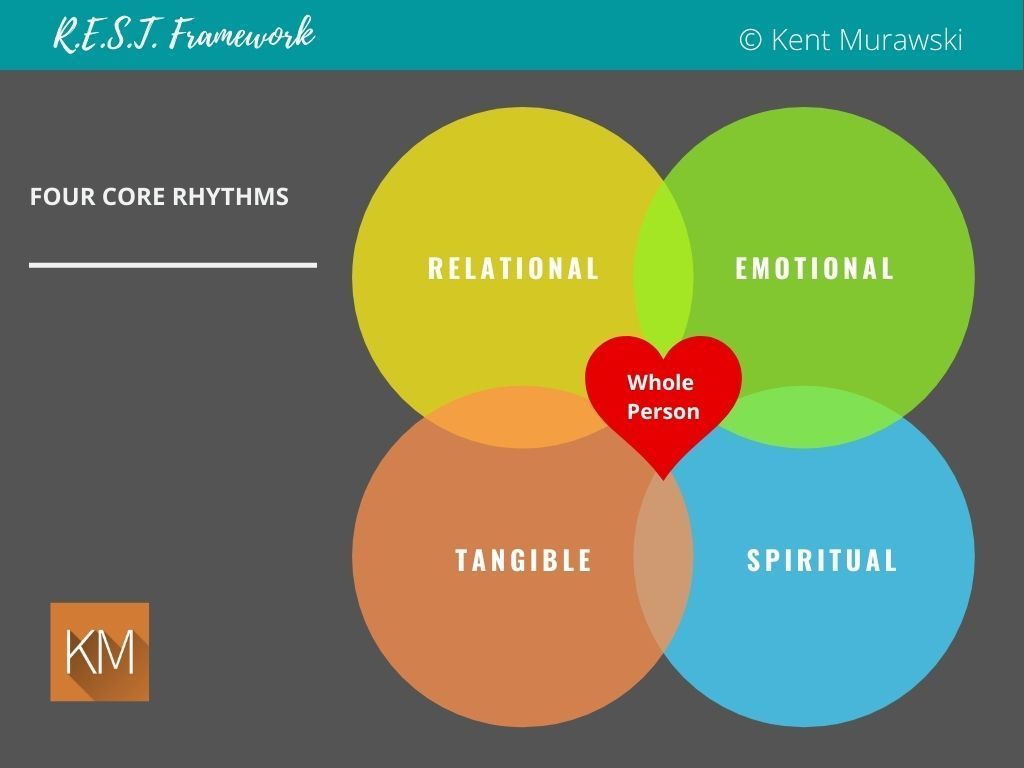Rhythms of Life 4: Who Will Bleed with You?
We all need people who will bleed with us. I call them your inner circle.
We become like those we spend the most time with.
This is a continuation of a series called Rhythms of Life. A Rhythm of Life is a way of life that provides structure and enables us to thrive and be whole in ALL of life rather than just ONE part. Here are the four core rhythms as I’ve defined them. We are currently on “Relational”.
- R – We are RELATIONAL beings
- E – We are EMOTIONAL beings
- S – We are SPIRITUAL beings
- T – We are TANGIBLE or physical beings
Real success and fulfillment come through wholeness and integration, not achievement.
If you missed one, you can access the whole Rhythms of Life series from here.
Who’s In Your Corner?
I recently went through a very challenging situation with someone close to me.
During that intense two-week period, my two closest friends were in constant communication with me. They reached out to me almost daily to check in and offer support.
It was a great strength to know I had people in my corner.
Loyalty is one of my personal core values. It’s also a word you don’t hear much anymore, almost like it’s antiquated or “old school.” So what is loyalty? The dictionary defines it as allegiance, commitment, dedication, and devotion, but I like to simplify it by saying,
Loyalty is being in the corner of those you love.
We all want some people to have our back. We want people we trust and rely on. Without loyalty, life feels meaningless and lonely. I want to be loyal to those in my inner circle, and I want them to be loyal to me. Not in the sense of duty or obligation – but in the sense of support, encouragement, and sacrifice for one another.
In order for a word to become a value, it must be paired with action. Here are some actions I assign to loyalty:
- Be there when they need me (normal life, tragedy, important events, etc.)
- Sacrifice wherever and whenever possible
- Invest time in the relationship
- Support their dreams
- Encourage them
Everyone longs for these types of relationships, but it seems like they are growing increasingly difficult to find and sustain. Despite our hyper-connected world, loneliness has become an epidemic.
A new report by Harvard University researchers finds that 36% of Americans are experiencing “serious loneliness”. Young adults ages 18-25 are among the most seriously affected. According to the research findings, 61 percent of young people ages 18 to 25 reported feeling lonely “frequently” or “almost all the time or all the time” during the four weeks preceding the fall survey.
There are three secrets to cultivating your inner circle. Over the next three posts, we will talk about three secrets to finding and cultivating your inner circle:
- Identify the people who will bleed with you
- Clarify your roles
- Invest Sweat Equity
#1 – Identify the people who will bleed with you
Who are the people who will show up for you in life? Who will bleed with you? Who will be there to catch you when you fall? Who will rejoice with you in your victories and cry with you in your setbacks?
They are your inner circle.
Robin Dunbar is an Oxford-educated anthropologist and psychologist who is known for what is now called Dunbar’s Number. Well, it’s actually a series of numbers. Dunbar discovered that people have a limited capacity in the number of people they can have in their social circles. This number increases or decreases by a factor of three. Dunbar calls it “The Rule of 3.” Here’s is what he discovered about how human beings group themselves as described by New Yorker Magazine and The Atlantic :
- 1.5 [the most intimate] – your romantic relationship
- 5 [close friends] – these are the people who will drop everything to support us when our world falls apart
- 15 [best friends] – this layer includes the previous 5, and your main social companions i.e. those you have fun with. These are the people we trust enough to leave our children with them.
- 50 – the number we call closish friends or those we may invite to a big weekend barbeque). You may see them often but you probably don’t describe them as “true intimates”
- 150 – these are your “meaningful contacts” and represent the people you would invite to a wedding or funeral.
The number gets larger, but the more people we add, the less meaningful the relationships become:
- 500 – acquaintances
- 1500 – people you can recognize
It’s best to think of this in a concentric circle.
 *For a more descriptive illustration, see this picture in the Atlantic.
*For a more descriptive illustration, see this picture in the Atlantic.
Finding Your Comrades
Your inner circle is most likely made up of some combination of your partner, your closest friends, and possibly a mentor, coach, or some other important figure in your life.
You might notice I have chosen not to include children in this circle. Though they are undoubtedly some of the most important relationships in your life, they are not able to bleed with you or offer friendship and loyalty until later in life.
If you’ve gone through this exercise and you’re still not sure who is in your inner circle or you’ve realized your inner circle is severely lacking, try this.
In his book, People Fuel, author, and psychologist John Townsend gives a very helpful framework for finding what he calls your “Comrades.” According to John, your comrades are “friends who know your business, making you fully known and fully loved, with no secrets or hiding.”¹ This doesn’t happen overnight, so give yourself three months at least. Here’s the framework taken from John Townsend’s book:
1) Go through your contacts list. Take a couple of hours and go down the list, with the goal of identifying people who you feel may be a good fit. Once you have that list, pick three who you think may be a good fit.
2) Reach out. Choose the first person you’ve identified and invite them to lunch or coffee. It can be as simple as, “I haven’t seen you for a long time, I would love to catch up.” It’s not a great idea to start with, “I’ve realized I have a relational deficit, and I would like to get together to see if you could be a comrade.” That could be weird.
3) Be there for the other person’s vulnerability. As you are talking, see if they happen to present some struggle in life. It might be something with work, family, or a health issue. You can’t control this, but you can be ready for it. If they do mention something, get into the pit with them. You could say something like, “I had no idea about your son being in trouble. I’m really sorry. That must be pretty hard for you.” They may not be used to having someone be empathetic with them. By doing this, you are showing them what you value, what you offer, and who you are.
4) Take a small risk. On your side of it, be vulnerable as well. Open up something in your life. This is a way to see whether the person might possibly belong in your inner circle. Townsend gives several possible responses to your vulnerability, one of which is the one you want.
- Deflection – does the person change the subject from something vulnerable to a safer area. This is not the desired response
- Avoidance of the negative – the person might say something like “it’s probably just a phase…hang in there…look at the bright side.” This is not your first-choice response.
- Advice giving – “Sorry to hear about your son getting in trouble…communication is key…you should get him off social media…I have a great counselor for him.” When someone is vulnerable, advice should never be the first response. Not the type of person for your inner circle. They want to fix everything.
- Self-referencing response or one-upping – “That reminds me when our daughter…then there was another time…you think that’s bad, my daughter.” The person may think telling stories is helpful but it leaves you feeling more alone. Active compassion – “I didn’t know about your son. This has got to be overwhelming for you. How are you doing with all this?” This may happen as the person puts down their fork, looks at you with care, and maybe leans in a bit. This is the response you are looking for!
5) Have two more meetings. If the individual gives you a sense of being interested in your struggle and capable of vulnerability, have a couple more coffees or lunches with them. You are looking for a trend, not a one-and-done. And by the way, make sure this meeting has to do with their life for half of the time! It’s not a coaching or counseling session, and you want to let them know that their struggles are important to you as well.
6) Make the invitation. Townsend advocates for what he calls a “Life Team,” but I want to simplify it a bit. You don’t need to necessarily officially invite them into your inner circle. Again, that’s a bit weird. You just want to say something like, “Listen, I’ve really enjoyed getting together with you these last three times. I find you easy to talk to, enjoy your company, and feel we can be open with each other. Would you want to make this a regular thing?” Over time, you both will probably feel more comfortable sharing the depth of your friendship.²
Hopefully, that gives you a good framework for finding your inner circle. I’ve used this framework myself and have found it to be very helpful for finding the people who belong in that inner circle.
Take the Next Step
Now it’s time to answer a few important questions.
Who is in your inner circle? Write down the people who will bleed with you.
What’s the next step you need to take when it comes to identifying, clarifying, or solidifying those in your inner circle?
Every one of us is meant to have a group of people who will bleed with us, and it’s worth every ounce of time and energy you invest to make it happen.
What have been your biggest struggles and frustrations when it comes to close friendships? I would love to hear back from you after you read it! Leave a comment and let me know.
Endnotes
¹ Townsend, John. People Fuel, 169
² Ibid, 182-185
* Photo by Toa Heftiba on Unsplash
Share this Post:













